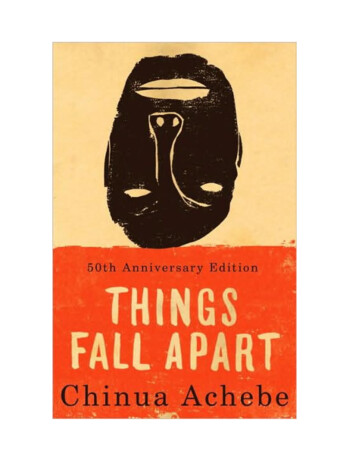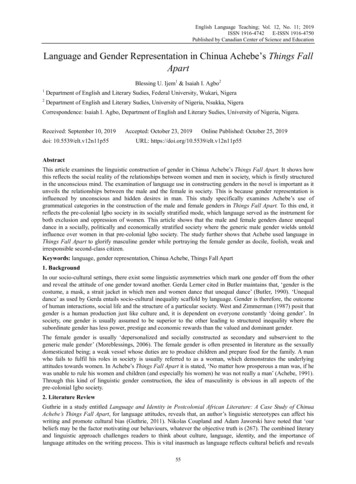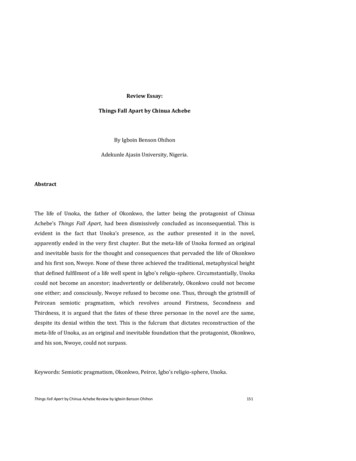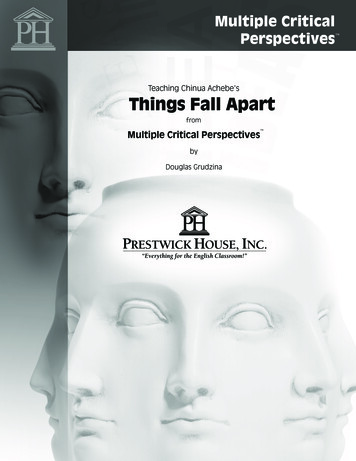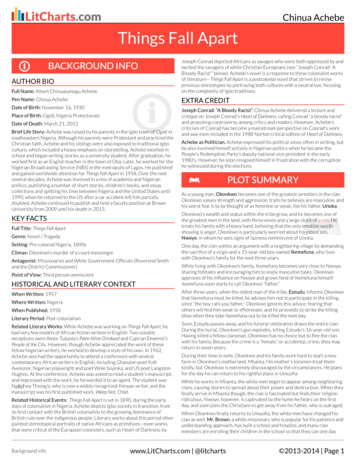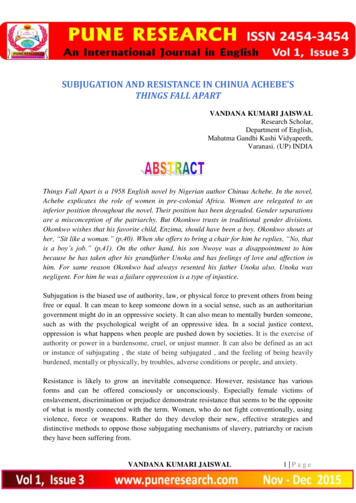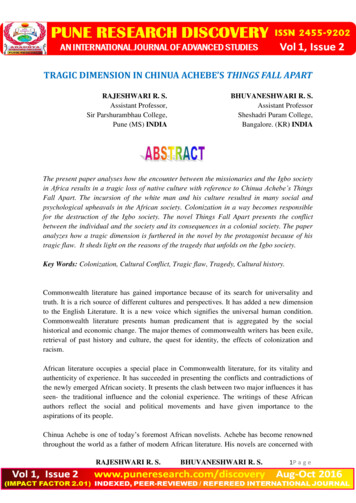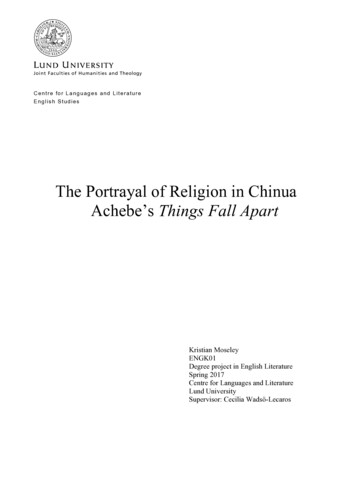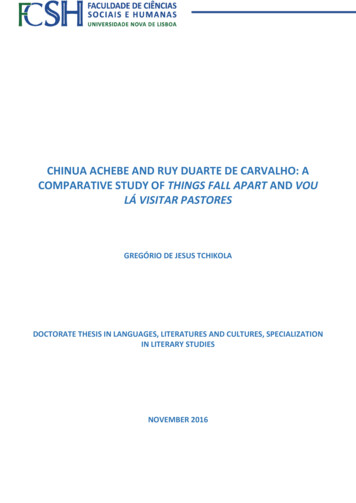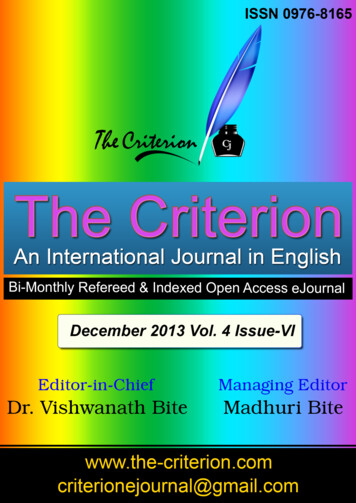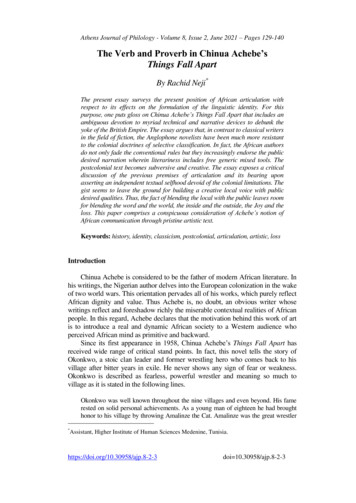
Transcription
Chinua A chebe Eric KimNick YunAllison Lee
Albert Chinualumoga Achebe Prominent Igbo (Ibo) writer, famous forhis novels describing the effects ofWestern customs and values on traditionalAfrican society.Achebe's satire and his keen ear forspoken language have made him one ofthe most highly esteemed African writersin English.
Albert Chinualumoga Achebe Born November 16,1930 in Ogidi, NigeriaSon of Isaiah andJanet Achebe Teachers in missionaryschoolDevout evangelicalProtestantsinstilled in him many ofthe values of theirtraditional Igbo culture
Ogidi
Albert Chinualumoga Achebe Schooling: Government College in Umuahia (1944)University College of Ibadan,studied English, history and theology Graduated with a BA, 1953 Rejected his British name and took hisindigenous name Chinua.
College of Ibadan
Chinua Achebe Traveled in Africa and America and workedfor a short time as a teacherJoined the Nigerian Broadcasting Companyin Lagos, 1954Director of External Services in charge ofthe Voice of Nigeria, 1960sMarried Christie Chinwe Okoli in 1961 Four children
Achebe’s Works THINGS FALL APART, 1958NO LONGER AT EASE, 1960THE SACRIFICAL EGG AND OTHER STORIES, 1962ARROW OF GOD, 1964A MAN OF THE PEOPLE, 1966CHIKE AND THE RIVER, 1966BEWARE, SOUL BROTHER, 1971GIRLS AT WAR, 1972HOW THE LEOPARD GOT HIS CLAWS, 1972CHRISTMAS IN BIAFRA AND OTHER POEMS, 1973MORNING YET ON CREATION DAY, 1975THE DRUM, 1977THE FLUTE, 1977LITERATURE AND SOCIETY, 1980THE TROUBLE WITH NIGERIA, 1983THE WORLD OF OGBANJE, 1986ANTHILLS OF THE SAVANNA, 1987THE UNIVERSITY AND THE LEADERSHIP FACTOR IN NIGERIAN POLITICS, 1988HOPES AND IMPEDIMENTS, 1989NIGERIAN TOPICS, 1989ed.: THE HEINEMANN BOOK OF CONTEMPORARY AFRICAN SHORT STORIES, 1992HOME AND EXILE, 2000
Achebe’s Literary Language Standard English blended with pidginIgbo (Ibo)vocabulary proverbs images speech patterns
G. D. Killam on Achebe All of Achebe’s writings display threeconcerns: the legacy of colonialism at both theindividual and societal levelsthe fact of English as a language of nationaland international exchangethe obligations and responsibilities of thewriter both to the society in which he livesand to his art
Chinua Achebe Things Fall Apart Achebe’s response to inaccurate portrayals ofAfrican civilization by British writers Conrad’s Heart of DarknessReiterates how colonization by Europeanmissionaries changed Igbo society afterNigeria was claimed
Uses language, which he sees as a writer'sbest resource, to expose and combat thepropaganda generated be Africanpoliticians to manipulate their own people.Faced with his people's growing inferioritycomplex and his leader's disregard for thetruth, the African writer cannot turn hisback on his culture.
"A writer has a responsibility to try and stop [thesedamaging trends] because unless our culture beginsto take itself seriously it will never.get off theground."He states his mission in his essay "The Novelistas Teacher": "Here is an adequate revolution for me to espouse -to help my society regain belief in itself and to putaway the complexes of the years of denigration andself-abasement. And it is essentially a question ofeducation, in the best sense of that word. Here, Ithink, my aims and the deepest aspirations of societymeet."
Things Fall Apart Setting: Nigeria toward the end of the 19thcentury, just before the arrival of thewhite man.Shows us what life was like in Nigeria in aspecific historical periodCenters on tribe known as the Ibo (Igbo)
Things Fall Apart Style Simple sentences Imagery “He grew rapidly like a yam tendril in the rainyseason.”Proverbs Much like its telling by a member of the Ibo tribe.“A toad does not run in the daytime for nothing.”Folk tales The Mosquito and the Ear (Ch. 9)
Things Fall Apart Religious beliefs: Supreme deity (Chukwu)Most powerful Controls fertility and creation Personal gods (chi) Believed to be in control of the person’s destinyAncestors (egwugwu)Greatly respected and worshipped Constant interaction between the worlds of theliving and the dead
Chinua Achebe Wrote two sequels to Things Fall Apartwhich feature descendants of Okonkwo \No Longer at Ease (1960) Shows how postcolonial Nigeria became corruptedby an alien government imposed upon them.The Arrow of God (1964) Further exploration of the failure of the British tounderstand traditional beliefs and values
)IOgbYrosh 0-c,''{'II(I(Iil.0Aboolo:00 AOO-EKtlILictlri::na Lo-K jaOO hQgbo0il c.o- r·1: ano·NIGE RIA,).,/\- Bc in,Q j··Jvocc,'l.,J i9ht.or'.6tninCAMEROON'I Blgl;cof.801:l'l}'/AJ'LAN1'1C.: CJC.:J:::AN:;- .,j l!(m;!k)U,!!1200(m i )l 5C1M r;ro·'JCer,on (NCS84 dat.im'J BiokoIsland'Cul/ of Cuinf'G9
Chinua Achebe Exiled from his homeland because of hiswritingsReturned for brief visit in 1998Started teaching in New York Univ. of Mass., Amherst, Univ. of Conn.,Dartmouth Univ., Bard Univ.An automobile accident in 1990 left Achebeconfined to a wheelchair .
“The African Writer and the English Language” Major problem – defining African literature “ you cannot cram African literature into a small, near definition. I donot see African literature as one unit but as a group of associated units –in fact the sum of all the national and ethnic literatures of Africa” (428).National literature: “one that takes the whole nation for its province andhas a realized or potential audience throughout its territory a literaturethat is written in the national language” (428).Ethnic literature: “one which is available only to one ethnic group withinthe nation” (428). eg. The national literature of Nigeria is the literature written in English and theethnic literature are Hausa, Ibo, Yoruba, Efik, Edo, etc.No defined group should be excluded from “African literature”
“The African Writer and the English Language” Why is the national literature of Nigeria and many other Africancountries is, or will be, written in English? “ these nations were created in the first place by the intervention ofthe British which, I hasten to add, is not saying that the peoplescomprising these nations were invented by the British” (429).What impact has colonialism had on Africa? “Colonialism in Africa disrupted many things, but it did create bigpolitical units where there were small, scattered ones before” (429). Unified countries of AfricaSome ethnic groups were divided into 2 or 3 powers“But on the whole it did bring together many peoples that had hithertogone their several ways. And it gave them a language with which totalk to one another. If it failed to give them a song, it at least gavethem a tongue, for sighing” (429).
The End Fondly called the "fatherof African literature",Achebe died after a shortillness on 21 March 2013in Boston, United States.An unidentified sourceclose to the family saidthat he was ill for a whileand had beenhospitalised in thecity.[Penguin publishingdirector Simon Windersaid: ".we are alldesolate to hear of hisdeath."[
THE SECOND COMINGTurning and turning in the widening gyreThe falcon cannot hear the falconer;Things fall apart; the centre cannot hold;Mere anarchy is loosed upon the world,The blood-dimmed tide is loosed, and everywhereThe ceremony of innocence is drowned;The best lack all conviction, while the worstAre full of passionate intensity.Surely some revelation is at hand;Surely the Second Coming is at hand.The Second Coming! Hardly are those words outWhen a vast image out of Spiritus MundiTroubles my sight: somewhere in the sands of the desertA shape with lion body and the head of a man,A gaze blank and pitiless as the sun,Is moving its slow thighs, while all about itReel shadows of the indignant desert birds.The darkness drops again; but now I knowThat twenty centuries of stony sleepWere vexed to nightmare by a rocking cradle,And what rough beast, its hour come at last,Slouches toward Bethlehem to be born?
achebe’sworks things fall apart, 1958 no longer at ease, 1960 the sacrifical egg and other stories, 1962 arrow of god,1964 a man of the people, 1966 chike and the river, 1966 beware, soul brother, 1971 girls at war, 1972 how the leopard got his claws, 1972 christmas in biafr
